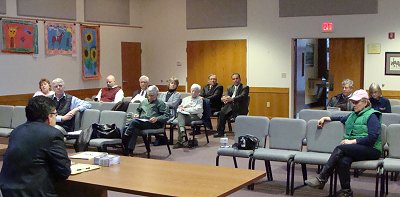- By Dan Veaner
- News
 Print
Print  About a dozen residents showed up for a public hearing Tuesday on the impact of a proposed PILOT (Payment In Lieu Of Taxes) renegotiation between Tompkins County and Lansing's biggest taxpayer, AES Cayuga. Of those, only four were not connected to the negotiation. The hearing was an opportunity for the public to make their opinions known to the county IDA (Industrial Development Agency) before it votes on whether to accept the agreement that will devalue the plant by $17.5 million for the 2011 tax year.
About a dozen residents showed up for a public hearing Tuesday on the impact of a proposed PILOT (Payment In Lieu Of Taxes) renegotiation between Tompkins County and Lansing's biggest taxpayer, AES Cayuga. Of those, only four were not connected to the negotiation. The hearing was an opportunity for the public to make their opinions known to the county IDA (Industrial Development Agency) before it votes on whether to accept the agreement that will devalue the plant by $17.5 million for the 2011 tax year.Tompkins County Area Development (TCAD) President Michael Stamm led the hearing with IDA members and other parties to the negotiation also present. The hearing format, required by State law, was only intended to get opinions from the public, not to answer questions. County officials held an informational meeting last week to explain the purpose of the PILOT and the reasons it has been renegotiated at this time, so soon after the first renegotiated agreement was signed.
The original agreement was negotiated starting in 2007 and signed in 2009. That year the agreed-upon assessed value was $160 million, up from $142 million in 2008. The first renegotiated agreement was signed in 2010, reducing the value for that year to $130 million. That was scheduled to be reduced by $10 million this year, but the plant will be assessed at $112.5 million if the new amended PILOT is passed later this month.
The largest negative tax impact applies to the Lansing school district, which is also reeling from state and federal aid cuts. Coupled with a lousy economy, the cut in school income from AES alone is the equivalent of taxes that would be paid by 87 and a half $200,000 homes.
 Of about a dozen people who showed up at the Lansing Town Hall Tuesday evening, only four were Lansing taxpayers not connected to the negotiation
Of about a dozen people who showed up at the Lansing Town Hall Tuesday evening, only four were Lansing taxpayers not connected to the negotiationLast year many critics, including IDA members questioned the process the IDA used to determine the value of the plant in the first renegotiation. In this new round stakeholders including school district and town officials were invited to the table. The school district hired industrial assessment expert Mike Coles, and School Superintendent Stephen Grimm says that without Coles' participation and advice the plant could have been valued at a lot less. Grimm was one of the fiercest critics of the 2010 version of the agreement, but he and most critics seemed satisfied with the process used in the latest negotiation, and resigned to the troubles the coal-fired plant is facing.
"I do want to thank the team and Martha for leading the team in a positive manner in a very difficult situation," Girimm said. "The rational approach tht was given to calculate the assessment using hard numbers was very good, and we were satisfied with the process. As a school district we are very thankful to AES Cayuga for the many years of tax revenue that the school has benefited from. If you add it up it translates into a lot of wonderful programs and opportunities for the children of Lansing."
Lansing Town Deputy Supervisor Connie Wilcox also praised the IDA for better communication. Town Councilwoman Kathy Miller sat at the negotiating table and reported to the Town Council as negotiations progressed. Wilcox had special praise for last week's informational meeting.
"I have to compliment the members of the negotiating team, and especially Mr. Coles for his information," she said. "It made it a lot clearer to me."
The problem comes down to a bad economy, lower electric prices, and a plant that is coal-fueled at a time when coal costs are up. Additionally coal emission control is expensive. AES is an international corporation that is planning to sell four New York power plants, including the Lansing plant.
Plant representative John Marabella says the plant has cut its budget considerably, and layoffs have resulted. He noted that two of the four plants AES intends to sell have been placed on 'protective layup', essentially shutting them down. He said renegotiating the PILOT is just one piece of the process the plant is going through to keep its costs in line so it can continue to produce electricity.
"We're doing the best we can to try to keep our costs as low as we can to keep the plant viable," he said Tuesday. "The value of the plant has decreased. It's not generating as much electricity as it once did. We're doing everything we can to keep it operating."
 Lansing School Superintendent Stephen Grimm (right) and consultant Mike Coles (seated)While Grimm is happy with the process, he is anything but happy about the reduction itself. On Monday the Lansing Board Of Education passed a $25,275,503 2011-2012 school budget that addresses a $2.1 million budget gap with a combination of reserve funds, unspent money from this year's budget, and a 1.9% rise in the tax levy that is estimated to raise the tax rate by 3.34% when tax bills are mailed out this summer. About a half million dollars in program cuts are built into this budget that will go to voters in May. Next year the budget gap is expected to increase to $2.8 million with fewer resources left to fill it, necessitating a further projected $870,000 in school program cuts.
Lansing School Superintendent Stephen Grimm (right) and consultant Mike Coles (seated)While Grimm is happy with the process, he is anything but happy about the reduction itself. On Monday the Lansing Board Of Education passed a $25,275,503 2011-2012 school budget that addresses a $2.1 million budget gap with a combination of reserve funds, unspent money from this year's budget, and a 1.9% rise in the tax levy that is estimated to raise the tax rate by 3.34% when tax bills are mailed out this summer. About a half million dollars in program cuts are built into this budget that will go to voters in May. Next year the budget gap is expected to increase to $2.8 million with fewer resources left to fill it, necessitating a further projected $870,000 in school program cuts.“This is a considerable hardship on taxpayers at this time and the last few years, resulting in hundreds of thousands of dollars that simply could not be transferred onto the taxpayers,” Grimm said. “We had to alleviate the impact of that through school program and staffing cuts over the last three years. Those have been significant.”
He noted the cuts were not exclusively due to the lesser valuation of the power plant. He said he is hoping for an economic turnaround that will help the plant become more profitable, and said school officials are helping that a sale of the plant will both help raise the value and productivity of the plant.
Grimm said that while the purpose of a PILOT is to stabilize the valuation of the plant so that both the power company and taxing authorities can best plan for future years, this PILOT has been anything but stable in its first three years.
Tompkins County Legislature Chair and IDA Chair Martha Robertson says she expects the new agreement to pass when the IDA votes on whether or not to accept it next week.
"We've had two discussions about this revision of the PILOT already," Robertson says. "So it's not new to the board. They know what they're looking at. I think they felt they had all their questions answered before they moved it to the public hearing."
Because the group was so small, some questions were answered, including one about whether the PILOT could be renegotiated upward as well as downward as the economy changes. It can. Robertson says the next negotiation will likely start in July. With the uncertainty about whether and when the plant will be sold, she says that time frame is flexible.
v7i15



